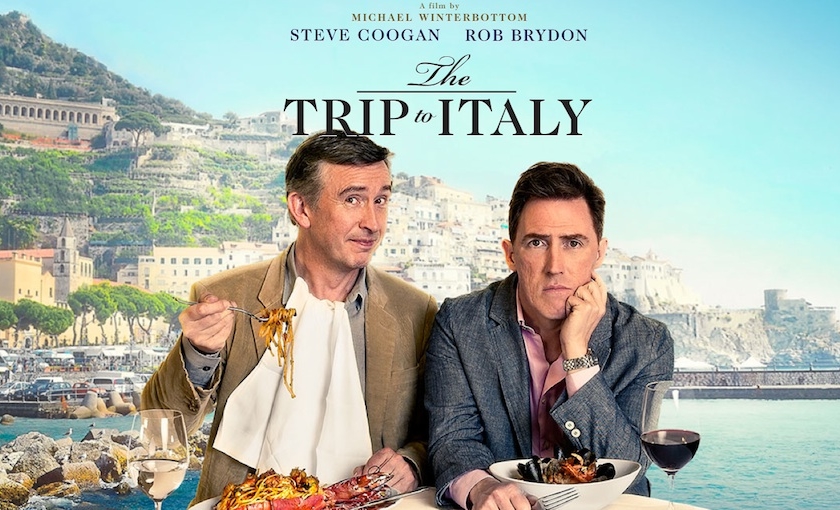In Michael Winterbottom’s 2010 mini-series-turned-feature-film The Trip, British comedians Steve Coogan and Rob Brydon play fictionalized versions of themselves on the job for The Observer reviewing restaurants in northern England’s Lake District. I first encountered the movie in one of those late-night Netflix gambles and found myself won over by its sly oscillation between low and high, light and dark: from outbreaks of irrepressible, knee-slapping improvisational dialogue over lunch to halting, bad-reception phone calls with aloof lovers in desolate, chilly moors at midnight; from a good-spirited and long-running Michael Caine impersonation contest, on the one hand, to the wrenching and not always unspoken rivalry between the two talented but supporting-role actors, on the other. Though the film does a nice job resisting the metaphorical cliché offered by its title, over the course of the six-day trip the pleasure of touring the two men’s “emotional terrain” proves even greater than that of experiencing the somber beauty of the northern landscape and (at one sensory remove) its culinary offerings. Whereas the younger Brydon, who has a happy wife and a baby girl at home, seems at peace with the state of his life and career, Coogan craves more than one-night stands and making people laugh. And it’s by taking the brunt of the film’s emotional burden that Coogan edges Brydon out of the center of our attention and sympathies.
This year’s sequel, The Trip to Italy, shakes things up a bit while at the same time recycling just about all the working parts of its predecessor’s formula. This makes sense, given each film’s origin as a season (British: “series”) of a TV show, but at times I found myself wondering whether I shouldn’t have saved my $7—Midwestern matinee—and watched the original again at home.
Instead of six days in the Lakes, in The Trip to Italy, we get six days along Italian coasts. Instead of Brydon-as-Burton recitations of Wordsworth and Coleridge, we get Brydon-as-Burton recitations of Byron and Shelley. More Michael Caine; Sean Connery reprised. The men make familiar jabs at each other’s careers, though this time around it’s Coogan we see gravitating towards something like stability and contentedness while Brydon finds himself chasing a career move and imperiling his love- and family-life with a woman he meets by chance.
But this isn’t to say that the film is unaware of its own dubious status as “sequel.” When Brydon phones Coogan to tell him that The Observer wants them to make and write up another trip, Coogan responds with some skepticism: “Really?” A little later they discuss the inevitable inferiority of the sequel, in general, to the original.
 Nor does the film come up short in its own right, despite the occasional obligatory “no homo” aside or unimaginative gaze at a sunbathing babe. But I loved The Trip to Italy’s wealth of intertextual references—Roman Holiday (1953), Journey to Italy (1954), The Godfather II (1974)—and its updated catalogue of impressions—gravelly and gravellier swipes at Christian Bale and Tom Hardy in The Dark Knight Rises (2012), not to mention, naturally, Michael Caine. And the film’s thematic stakes are ambitious—aging, death, posterity. Brydon and Coogan visit memorials and cemeteries and meditate, willingly or unwillingly, hilariously or not, on not only their own deaths but also what they’ll leave behind and how they’ll be remembered, or if. Eventually we come to see the endless impressions in a new harsh light, for what they really are: not impersonations of Michael Caine or Al Pacino but impersonations of unreachable greatness, hollow if momentarily entertaining. But we haven’t come actually expecting Pacino or Dustin Hoffman, Wyler or Rossellini. Like most sequels, as talents the two actors (as they play themselves) are later and lesser, there at best to help us re-experience old joys, but at least they know it.
Nor does the film come up short in its own right, despite the occasional obligatory “no homo” aside or unimaginative gaze at a sunbathing babe. But I loved The Trip to Italy’s wealth of intertextual references—Roman Holiday (1953), Journey to Italy (1954), The Godfather II (1974)—and its updated catalogue of impressions—gravelly and gravellier swipes at Christian Bale and Tom Hardy in The Dark Knight Rises (2012), not to mention, naturally, Michael Caine. And the film’s thematic stakes are ambitious—aging, death, posterity. Brydon and Coogan visit memorials and cemeteries and meditate, willingly or unwillingly, hilariously or not, on not only their own deaths but also what they’ll leave behind and how they’ll be remembered, or if. Eventually we come to see the endless impressions in a new harsh light, for what they really are: not impersonations of Michael Caine or Al Pacino but impersonations of unreachable greatness, hollow if momentarily entertaining. But we haven’t come actually expecting Pacino or Dustin Hoffman, Wyler or Rossellini. Like most sequels, as talents the two actors (as they play themselves) are later and lesser, there at best to help us re-experience old joys, but at least they know it.
At one hotel overlooking the beach, the receptionist lists some of the legendary actors and celebrities who have stayed in their Greta Garbo suite; when Coogan adds, “And now Rob Brydon and Steve Coogan,” we laugh at the joke—because it’s funny—while at the same time registering the tragic fact that it is, of course, a joke.

